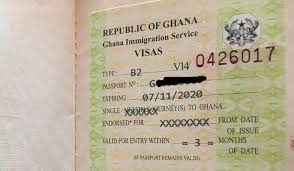In a landmark announcement that promises to bolster economic and cultural ties across the African continent, Ghana has introduced a bold new policy that allows visa-free entry for all African passport holders. The policy, which officially began on January 1, 2025, is seen as a significant stride towards the realization of Africa’s long-standing goal of economic integration and free movement of people.
President Nana Akufo-Addo made the historic announcement during his final state of the nation address on Friday, as he prepares to hand over the reins of leadership after two terms in office. Addressing a packed parliament, Akufo-Addo explained that this visa-free initiative is not just a diplomatic gesture but a strategic move towards a more connected and economically integrated continent.
“I am proud to have approved visa-free travel to Ghana for all African passport holders, with effect from the beginning of this year,” President Akufo-Addo said, with a tone of both pride and conviction. “This is the logical next step in the African Continental Free Trade Area (AfCFTA), and the workings of the largest trading bloc in the world. This initiative is essential to the realization of the African Union’s Agenda 2063, which envisions a fully integrated and connected Africa by 2063.”
The visa waiver is a major boost to Africa’s ambitions of breaking down borders within the continent, which have long been a barrier to trade, tourism, and cultural exchange. Ghana’s new policy follows in the footsteps of other African nations like Rwanda, Seychelles, Gambia, and Benin, which have already taken similar steps to welcome travelers from across the continent.
Prior to this, Ghana had already extended visa-free access to citizens of 26 African countries, while nationals from 25 others could obtain visas on arrival. Only Eritrea and Morocco were exceptions, requiring visas before entry. Now, with the new policy, any African citizen with a valid passport will be able to enter Ghana without needing a visa, further solidifying the country’s role as a hub for regional cooperation and unity.
This development builds on Ghana’s efforts in the past few years to enhance its image on the global stage. The 2019 “Year of Return” campaign, which marked the 400th anniversary of the transatlantic slave trade, brought a flood of African diasporans and international celebrities to the country, many of whom were granted citizenship. This campaign was widely praised for its role in reuniting Africans in the diaspora with their ancestral homeland and has left an indelible mark on Ghana’s tourism sector.
In his address, President Akufo-Addo also highlighted Ghana’s economic strides during his tenure, despite facing significant global challenges. He proudly noted an increase in the country’s gross international reserves, which rose to $8 billion in 2024, compared to $6.2 billion in 2017. This improvement reflects the nation’s resilience and growth, particularly as it recovers from the economic shocks caused by the COVID-19 pandemic.
“Ghana’s economy has returned to its pre-COVID growth trajectory,” Akufo-Addo declared, projecting a growth rate of 6.3% for the year 2025. “I leave behind a Ghana that is thriving, one that has navigated significant global challenges with remarkable tenacity, whose economy is steadily rebounding, and whose institutions are operating effectively.”
While Ghana’s economic outlook seems promising, the country has not been immune to the broader economic turmoil facing many nations globally. Since 2022, Ghana has been grappling with one of its worst economic crises in decades, largely due to a combination of external shocks, fiscal mismanagement, and the impact of the COVID-19 pandemic. However, with the support of a $3 billion relief package from the International Monetary Fund (IMF), the country is slowly recovering.
Akufo-Addo’s announcement on visa-free travel is seen as one of his final contributions to Ghana’s pan-African vision, one that emphasizes regional cooperation and solidarity. The move is expected to not only facilitate greater ease of travel but also enhance trade and investment between Ghana and other African nations. Experts believe this policy could unlock untapped potential within Africa, encouraging the flow of ideas, skills, and capital across the continent.
The announcement also comes at a pivotal time for Ghana, as President Akufo-Addo prepares to step down and hand over power to his successor, John Mahama, who won the December 2024 elections. Mahama, a former president and a member of the National Democratic Congress (NDC), is expected to continue the policies set out by Akufo-Addo, though he may bring his own vision to the table.
For many African citizens, the new visa-free policy will be a welcome change, offering greater freedom to explore new opportunities in one of West Africa’s most stable democracies. The move is expected to encourage more tourists, businesspeople, and students to visit Ghana, potentially boosting the country’s tourism and education sectors.
Ghana’s commitment to openness and African unity has made it a shining example of what can be achieved when countries prioritize cooperation over division. The visa-free entry initiative could set a precedent for other African nations to follow, especially as the continent moves towards a more interconnected and prosperous future under the AfCFTA framework.
As Africa continues to face economic challenges, political instability, and external pressures, initiatives like Ghana’s visa-free travel offer a glimmer of hope for the continent’s future. With President Akufo-Addo’s legacy firmly established, the eyes of Africa are now turned towards the future, where greater integration and mutual support could reshape the continent for generations to come.
Ghana has long been regarded as one of Africa’s leading democracies, known for its political stability, vibrant culture, and robust economic performance in recent years. The country’s commitment to regional integration is evident in its active participation in the African Union and its leadership role in initiatives like the AfCFTA, which aims to create a single market for goods and services across the continent. With the introduction of visa-free travel, Ghana is solidifying its position as a beacon of African unity and progress.

